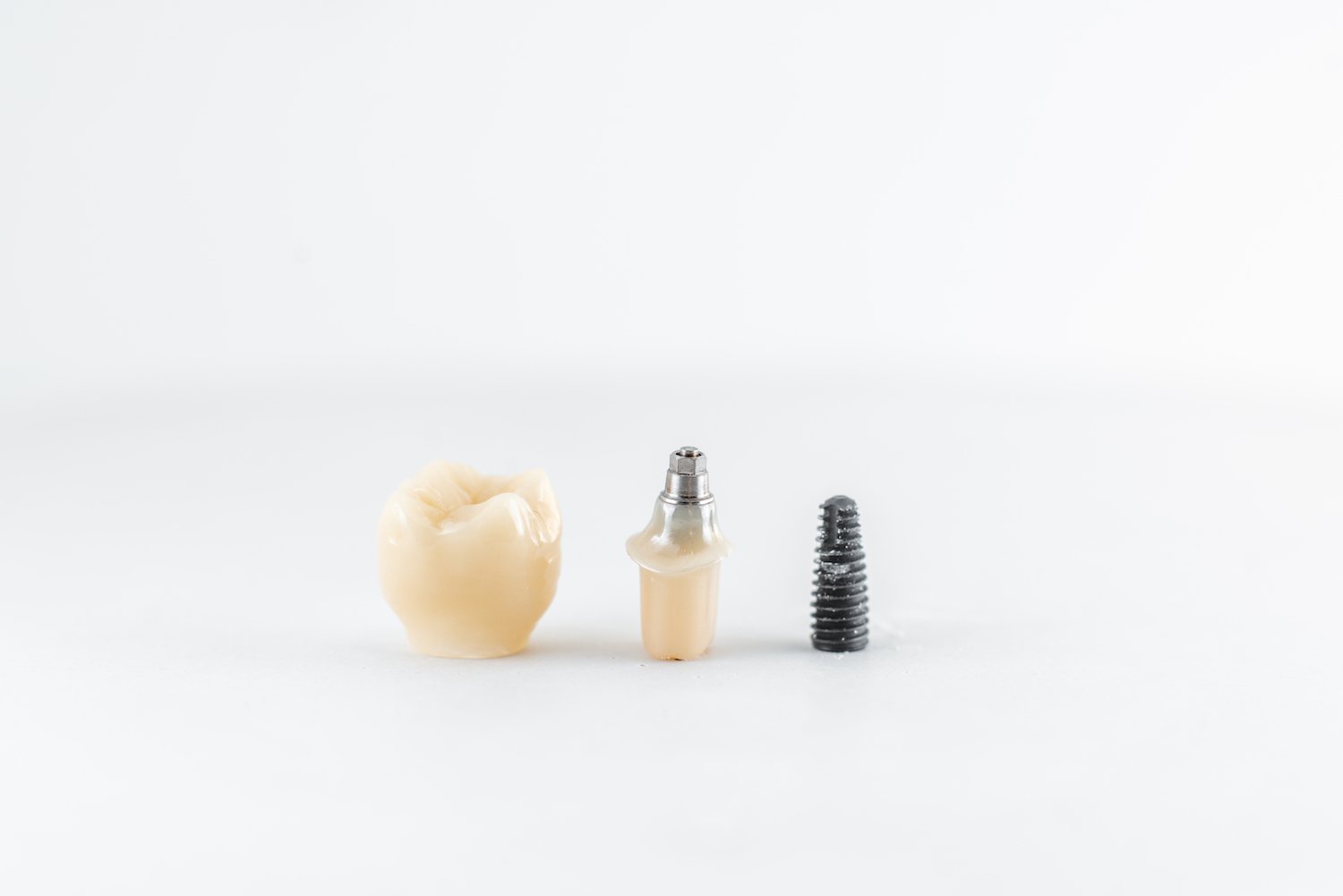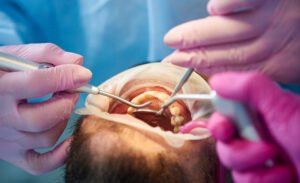Dental crowns are a necessary component of many root canal procedures, but many patients remain unsure of their importance. Patients fear root canal therapy in and of itself, but it may appear even more frightening when combined with the essence of a dental crown. Before deciding to undergo a root canal procedure without a dental crown, it is critical to understand the risks and benefits of your choice. However, let us first review the fundamentals of root canal treatment and why a dental crown after a root canal is required following the procedure.
Read More: How do scaling and root planning help address gum diseases?
What is a Root Canal Procedure?
Root canal therapy is a dental procedure that eliminates bacteria from infected tooth canals, preventing reinfection and preserving your tooth. When you receive root canal therapy, the infected or inflamed pulp is removed, and the interior portion of your tooth is disinfected and cleaned, followed by sealing and filling.
Patients will have a tooth that is painless and hollow following the therapy. Because the tooth will be devoid of pulp, a crown can help strengthen it and prevent further decay. This is why a dental crown is mandatory after a root canal treatment. Let’s look at the dental crown and its importance for a healthy oral cavity.
Must see: 8 Tips to Follow After Completing a Root Canal Therapy
What is a Dental Crown?
A dental crown is one of the most frequently performed dental procedures. It is a tooth-shaped cap that surrounds your tooth, protects decayed or damaged teeth and helps them retain their structural and functional integrity. It enhances your teeth’ natural appearance and contributes to their aesthetics.
There are different types of dental crowns which are available in tooth-colored ceramics such as porcelain or metals such as gold or stainless steel. Once cemented in place, the dental crown completely encases the tooth and aids in the restoration of the tooth’s appearance, strength, and function.
Check Now: What Are the Common Types of Dental Bridges?
When should one consider getting dental crowns?
- The structural strength is greatly compromised in teeth with large fillings or following a root canal procedure. A dental crown protects such a tooth from fracture.
- Dental crowns are used as a structural component of dental bridges. In a three or multiple-unit bridge, the artificial tooth is suspended between dental crowns on either side. These dental crowns are cemented onto the adjacent abutment teeth.
- Porcelain dental crowns can be used to restore teeth that are discolored, stained, or misshapen and cannot be corrected with teeth whitening or dental veneers.
- A dental crown can keep a cracked or broken tooth in place if it is still vital.
- Dental crowns are a critical component of the dental implant framework because they serve as a replacement tooth in the mouth during the dental implant procedure.
- Stainless steel dental crowns are also used to restore children’s decayed or damaged primary teeth. This is done to avoid premature deciduous tooth loss, which can interfere with the timely eruption of permanent teeth and result in future misalignment problems.
Must See: The Do’s and Don’Ts to Follow While Wearing Braces
Why do you need a dental crown after a root canal treatment?
Tooth fragility
The dentist opens the tooth’s chamber during root canal therapy and extracts the infected material called pulp and all of its blood supply. The pulp’s primary function is to nourish the tooth, and when it is removed, the tooth loses vitality and resilience. As a result, a tooth with a root canal is more brittle and requires a Dental Crown to withstand daily chewing forces.
Check Now: What Are the Different Types of Dentures You Can Consider Wearing?
Significant tooth structure loss
Most teeth presented for root canal treatment were severely carious teeth, referred to as grossly carious teeth. For treatment purposes, dentists must remove caries, which results in the loss of the majority of the tooth structure. As a result, maintaining the basic tooth shape with a Dental Crown is critical following a root canal.
Must Read: 7 Effective Daily Routines to Follow for Ideal Oral Hygiene
For aesthetic purpose
Root canal therapy also treats traumatic and infected teeth that experience pulp necrosis. Pulp death is the primary cause of tooth discoloration or dental staining. Thus, a Dental Crown is critical for tooth esthetics and conceals dental staining following the root canal.
Prevent tooth reinfection
Following root canal therapy, a perfect coronal seal is required to prevent food packing and avoid the invasion of disease-causing bacteria that can result in tooth reinfection. The inadequate seal creates a continuous pathway for bacteria to enter the tooth structure and form plaque. As a result, dentists in Calgary strongly recommend a dental crown after a root canal.
Read More: What are the situations that demand a crown replacement?
Attempt to Avoid Root Fracture
Following the Root Canal, a Dental Crown protects the tooth from root fracture. According to studies, a vertical root fracture is a very common complication following root canal treatment and is also one of the primary causes of endodontic failure. As a result, dentists strongly recommend a Dental Crown in Calgary following a root canal.
How is a Dental Crown Placed?
A dental crown procedure is straightforward and typically takes no more than 2-3 appointments. After treating the tooth for decay or damage, the tooth’s outer enamel layer is trimmed down. This is accomplished to make room for the dental crown placed on it. Most teeth requiring a dental crown in Calgary undergo a root canal procedure first.
Check Now: Understanding the components and working mechanism of braces
The amount of enamel removed from a tooth varies according to the dental crown used. Stainless steel crowns are more durable and can be made very thin. As a result, teeth receiving metal crowns require less trimming than teeth receiving porcelain or porcelain-fused-to-metal crowns. Porcelain crowns are thicker than metal crowns to increase their strength; as a result, teeth prepared for porcelain crowns must be shortened significantly more than teeth prepared for metal crowns.
After tooth preparation, the dentist will take an impression of it and send it to a dental laboratory for fabrication. A temporary dental crown is placed on the tooth for approximately two weeks while the laboratory fabricates the permanent dental crown.
Read more: How often should you prefer professional dental cleaning, and why?
Once the dentist checks for the proper fit, the permanent crown is cemented onto the tooth during a subsequent visit. Additionally, the dentist will examine the patient’s bite to ensure that the crown does not sit higher than the remaining teeth. Any necessary adjustments to the dental crown are made before the crown is cemented into place.
Dental Crowns: How to Care for Them?
Dental crowns require proper oral hygiene to ensure their longevity and maintenance as natural teeth. Accumulation of food and plaque at the tooth-crown interface is a common occurrence that can decay the tooth beneath the dental crown. To extend the life of the dental crown, one should do brushing your teeth at least twice a day and floss regularly, particularly around your dental crowns.
Additionally, patients are advised to avoid chewing on hard foods such as nuts or ice, resulting in dental crown fracture. Sticky foods such as chewing gum, on the other hand, pose a risk of dislodging the dental crown and should be avoided.
Individuals who grind or clench their teeth regularly may cause damage to their dental crowns over time. These individuals can greatly benefit from sleeping with a mouth guard to protect the structural integrity of their dental crown.
Additionally, it is recommended that individuals who have dental crowns visit their dentist regularly to avoid developing dental problems.
Check Now: Different Types of Invisalign You Should Know About Before Getting One
Dental Crown Complications
Dental crowns rarely cause complications when properly cared for. However, some people may encounter difficulties as a result of them, including the following:
- Sensitivity and discomfort in the teeth immediately following dental crown placement in Calgary. This typically resolves within a few days as the patient becomes accustomed to eating and speaking with the dental crown.
- After a few days, a dental crown becomes loose. This occurs due to an incorrectly fitted crown or cement leaching out from the tooth-crown interface.
- A dental crown fracture or crack occurs due to eating or biting into something. This is more prevalent with ceramic crowns, so patients are advised to refrain from eating or biting down on hard foods while wearing dental crowns in Calgary. The dentist can repair small chips in dental crowns on occasion. A fracture of this type occurs when a small piece of porcelain chips away from a PFM crown. The porcelain layer can be repaired as long as the metal layer beneath is intact.
- Although rare, allergic reactions to the metal component of a dental crown are possible.
- Gum disease is a possible complication in people who practice poor oral hygiene. Dental crowns increase the likelihood of plaque and food accumulation around the crown’s edges, which must be cleaned regularly to avoid gum disease development.
Must See: How to take care of your dental bridges without worrying
Conclusion
You must be aware of the benefits of having a dental crown after a root canal and the risk of not having it. Thus, from now onwards, complete it with a dental crown whenever you need root canal treatment. Those who have gone through root canal therapy but without crowns immediately contact our dental clinic in Calgary to get it done.















